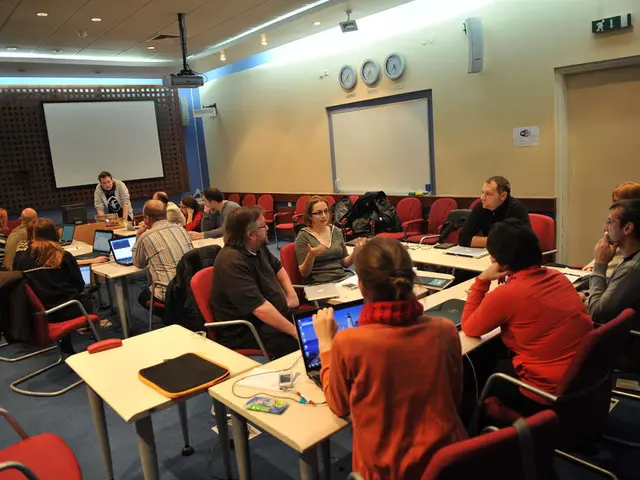Schoolgoers from Generations Z and Alpha are Embracing ChatGPT as a Studying Tool in Educational Institutions
In the rapidly evolving digital landscape, the interaction between young generations and artificial intelligence (AI) is becoming increasingly prevalent. This is particularly true in the realm of education, where Gen Z and Gen Alpha students are adapting to the use of AI tools in their academic pursuits.
### Gen Z Students
A significant number of Gen Z students are embracing AI for educational purposes. For instance, 56% of Gen Z students use AI for test preparation, and 46% for note-taking[1]. The use of AI for schoolwork is also on the rise, with higher usage observed among business and STEM majors compared to humanities majors[4].
However, research suggests that the use of AI tools like ChatGPT for homework can lead to shallow engagement and diminished comprehension. An MIT study found that essays written with ChatGPT lacked original thought and were described as "soulless"[2][3]. This raises concerns about the potential impact of AI on critical thinking skills.
### Gen Alpha Students
Exposure to AI for Gen Alpha students is growing, with 64% of children aged 6-14 having already interacted with AI[5]. As they progress through their education, the impact of this early exposure on their attitudes towards AI use for educational purposes remains to be seen.
While the current stance of Gen Alpha students on using AI for homework is not well-documented, it's evident that some students still prefer to learn on their own rather than relying on AI for their assignments.
### Case Studies: Amari and Sadie
Amari Holt, a 13-year-old seventh grader, wakes up at 5:45 a.m., attends school from 7 a.m., and gets home from school play rehearsals around 6 p.m. After dinner, she has about an hour and a half of homework. Amari reports that the use of AI has become more common at her school, but she is committed to doing her own work.
Sadie, a 16-year-old student, is against using AI like ChatGPT for schoolwork. She is concerned about the potential for cheating and lack of understanding when using AI for schoolwork. Sadie, who is committed to a college where she will play soccer, believes that using AI doesn't allow for proper processing of information.
Two years ago, only 13% of teenagers aged 13 to 17 used ChatGPT for their homework. According to a Pew Research Center study, 26% of teenagers aged 13 to 17 have used ChatGPT for their homework this year[6]. This suggests that while the use of AI is on the rise, the majority of teenagers are still not using AI in their assignments.
In conclusion, while Gen Z students widely use AI for homework, there are concerns about its impact on learning quality. Gen Alpha's early exposure to AI may shape their future attitudes towards using AI tools for educational purposes. However, it's clear that some students, like Amari and Sadie, remain committed to learning on their own and value the traditional methods of education.
[1] Pew Research Center (2021) [2] MIT Media Lab (2022) [3] Nature (2022) [4] Education Data Initiative (2021) [5] Common Sense Media (2021) [6] Pew Research Center (2023)
- The integration of technology in education and self-development is evident through the increasing use of AI tools by Gen Z students, with 56% using AI for test preparation and 46% for note-taking.
- General news highlights the concerns about the potential impact of AI on critical thinking skills, as research suggests that the use of AI for homework can lead to shallow engagement and diminished comprehension.




